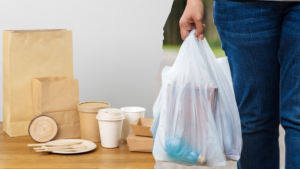4 Steps to a Plastic-Free Kitchen: Paving the Path to Sustainability
Introduction
Plastic pollution has become an undeniable global crisis, infiltrating our oceans and ecosystems at an alarming rate. From ubiquitous plastic bags to persistent single-use straws, plastics have embedded themselves in our daily routines. However, one of the most significant areas we can address is our kitchen, where a shift towards sustainability can begin with small yet impactful actions. In this article, we will unveil four straightforward methods to rid your kitchen of plastics and move towards a greener, more sustainable life.
Opt for Reusable Containers
Why it’s important
Single-use plastic containers contribute massively to environmental pollution. They often end up in landfills or oceans, where they take centuries to decompose.
How to proceed
Replace your plastic containers with durable alternatives made of glass, stainless steel, or other eco-friendly materials.
Invest in a varied set of containers of different sizes to meet all your food storage needs.
Prioritize containers with airtight lids for better food preservation.

Advantages
Increased durability: These containers last much longer than their plastic counterparts.
Food safety: Glass and stainless steel don’t release harmful chemicals into your food.
Versatility: Usable in the refrigerator, freezer, and often in the oven.
Practical tips
Start by replacing one type of container at a time to make the transition more manageable.
Reuse glass jars from purchased products as additional containers.
Eliminate Plastic Bags
The scale of the problem
Millions of plastic bags are discarded each year, creating a wave of pollution that suffocates marine life and clogs our landfills.
Alternative solutions
Invest in reusable bags made of fabric, canvas, cotton, jute, or hemp.
Always keep a few reusable bags in your car or handbag for unexpected purchases.
For bulk products, use mesh or lightweight fabric bags.
Implementation
Systematically refuse plastic bags offered in stores.
Create the habit of always having your reusable bags with you when shopping.
Encourage those around you to adopt this practice by offering reusable bags as gifts.
Long-term impact
Significant reduction in your personal plastic footprint.
Potential savings in stores that charge for plastic bags.
Contribution to collective awareness about plastic pollution.
Embrace Natural Cleaning Solutions
The drawbacks of conventional products
Conventional cleaning products are often packaged in plastic and contain chemicals harmful to the environment and health.
Natural alternatives
White vinegar: excellent natural disinfectant and descaler.
Baking soda: perfect for scrubbing and deodorizing.
Lemon juice is a powerful natural cleaning and deodorizing agent.
Essential oils: To add a pleasant fragrance to your homemade cleaning solutions.
Basic recipes
1. All-purpose cleaner: Mix equal parts water and white vinegar in a glass spray bottle.
2. Scouring paste: Make a paste with baking soda and a little water.
3. Natural deodorizer: In a spray bottle, mix water, a few drops of essential oil, and a bit of lemon juice.
Advantages
reduction in plastic packaging.
substantial savings on household products.
a healthier home environment, free from harsh chemicals.
Step 4: Switch to Plastic-Free Kitchen Tools
Identifying plastic sources
Take inventory of your plastic utensils: spatulas, spoons, cutting boards, etc.
Alternative materials
Bamboo: Renewable, durable, and naturally antibacterial.
Wood: Warm and eco-friendly, perfect for cutting boards and utensils.
Stainless steel: Durable, hygienic, and recyclable.
Food-grade silicone: A more durable alternative to plastic for certain utensils.
Replacement strategy
Gradually replace your utensils as they wear out.
Prioritize quality over quantity to ensure the longevity of your new utensils.
Explore local artisan markets for unique and sustainable options.
Maintenance of new utensils
Wood and bamboo: Oil regularly to extend their lifespan.
Stainless steel: Clean with white vinegar to maintain their shine.
Avoid the dishwasher for wooden and bamboo utensils.
Conclusion
Cultivating a plastic-free kitchen is an essential step towards a more sustainable existence. By adopting reusable containers, eliminating plastic bags, embracing natural cleaning solutions, and opting for eco-friendly kitchen tools, you can make a significant difference in your daily life and contribute to the broader goal of environmental conservation.
Remember that the transition doesn’t have to be abrupt. Every small change counts and adds up to create a lasting positive impact. By following these four steps, you’re not only transforming your kitchen but also becoming a model of sustainability for those around you.
As you embark on this journey towards a plastic-free kitchen, keep in mind that every choice matters. Your commitment to a more sustainable life doesn’t stop at your kitchen; it radiates into all aspects of your life, inspiring others and contributing to a broader movement towards a cleaner, greener future.
Let these four steps guide you in creating a plastic-free kitchen—a small but significant change that paves the way for a healthier planet for generations to come.
I’ve translated the expanded article into English, maintaining the same structure and detailed content. This version provides a comprehensive guide to creating a plastic-free kitchen, with practical tips, explanations, and insights for each step.
If you’d like any further modifications or have any questions about specific parts of the translation, please don’t hesitate to ask. I’m here to help!
FAQs:
Q: Can I recycle plastic containers in my kitchen?
While recycling plastic containers is better than throwing them away, it’s still not the best solution. The recycling process requires energy and resources, and not all plastic is recyclable. It’s better to opt for reusable glass or stainless steel containers that can be used for years and don’t require recycling.
Q: Can I use plastic bags if I recycle them?
While recycling plastic bags is better than throwing them away, it’s still not a sustainable solution. Plastic bags take hundreds of years to decompose and can cause harm to wildlife and the environment. It’s better to bring your reusable bags or choose paper bags if they are available.
